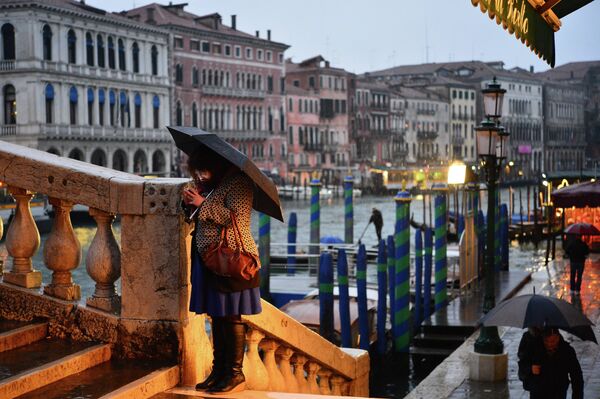MOSCOW, April 3 (RIA Novosti), Daria Chernyshova - The core arguments for Venetian independence are economic, as the Venice region is subject to a huge fiscal robbery of 20 billion euros ($28 billion) every year paid in taxes to Rome, said Paolo Bernardini, Professor at Insubria University in Como and a supporter of Venetian independence.
"20 billion euros ($28 billion) are taken away every year by the central government in Rome, just to fuel local privileges, widespread corruption and an inefficient and gigantic bureaucracy," Bernardini told RIA Novosti.
On Wednesday, Italian police arrested 24 men, including a former lawmaker, on suspicion of plotting a secessionist movement in the northern Venice region, Veneto. Police say the detainees modified a bulldozer with a makeshift cannon in a plan to assault St. Mark's Square in Venice. The scheme resembled the 1997 seizure of the square's bell tower by armed activists calling for an independent Venetian republic.
Activists want to hold an independence referendum that would return the city and the surrounding area of Veneto to the status of an independent republic, which it held for over 1100 years before Napoleon deposed its last leader in 1797.
"Economically, if Venice leaves the Italian state, the crisis is over for us. The Venetian region gives almost 70 billion euros ($96 billion) in taxes to the Italian state, and we receive 49 billion euros ($67 billion) back in services like healthcare. So we give more than we receive," Nicola Gardin, one of the founders of the Indipendenza Veneta political movement told RIA Novosti Thursday.
Like other major regions of the country, such as Milan and Lombardy, Veneto is strangled by Italian taxes, which are well above 60 percent.
"According to contemporary economics, a small, efficient, low-tax (flat-tax) state is a much better performer than a big leviathan. It is also the case for federations of states, and city-states like Hong Kong or Singapore. Venice might soon become one of them," Paolo Bernardini said.
Some international experts believe that Veneto's sovereignty bid is inspired by Crimea, where over 96 percent of voters supported reunification with Russia at a historic referendum last month, which Russian President Vladimir Putin said was in full compliance with the UN charter and international law.
"The Crimean people were allowed to vote for self-determination, and they decided to join Russia, which is a choice to be respected, for it was freely taken by the overwhelming majority of people," Bernardini said. "In 2014, we will see similar process for Scotland and Catalonia. It is part of a global trend," he added.
"The Venetian people have a right to vote in a referendum for Veneto independence, as people in Crimea did," Gardin said. "Italy wants to give us autonomy, but it's not a real solution. We want a referendum where the Venetian people can vote for independence," Gardin said. "People should be asked if they want to stay in the Italian state or become a Venetian republic," he added.
Last month, local independence activists and parties launched an online vote to secede from Italy and declare an independent Republic of Veneto. Eighty-nine percent of respondents voted for Veneto to break away from Italy. The vote was not recognized by Italian authorities, but activists believe it will help them legitimize calls for an official referendum.


